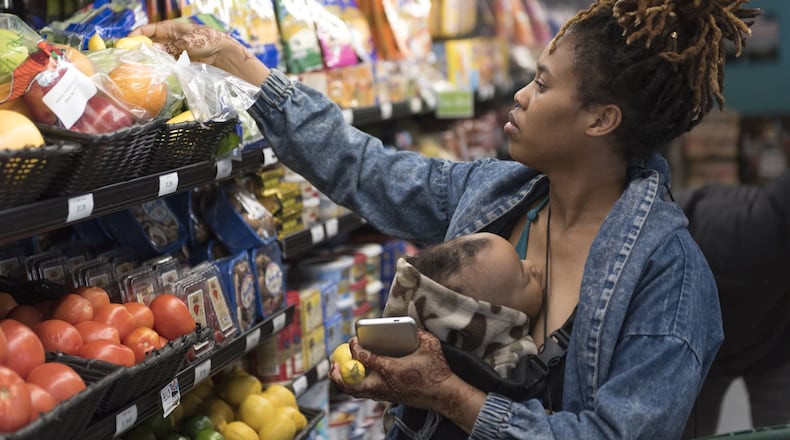Jeff Delp views the Carver Neighborhood Market in Historic South Atlanta as one way to “bring a neighborhood back to life.”
The market, which opened in 2015 on McDonough Boulevard, is doing so by providing healthy food options and jobs.
It goes beyond food, though.
“It give neighbors a place where they can gather and meet,” said Delp, director of economic development for the Atlanta-based nonprofit Focused Community Strategies, which partners with underserved communities to foster development. “There’s something about bumping into an old friend or someone you know in the store. Neighbors need a place like that. It also gives the neighborhood something to be proud of.”
Historic South Atlanta is located in what was longa food desert, meaning there was a lack of access to affordable and healthy foods. Such areas are usually located in poorer areas of town and have often been overlooked by larger chains. The area was once the home of Atlanta University and Gammon Theological Seminary.
Today with initiatives like Carver Neighborhood Market, things are changing as downtown workers and professionals move in who yearn for intown living. Some homes have been built by Habitat for Humanity. Others have been renovated or built through FCS.
The presence of the market has helped fill a gap between larger grocery store chains that are located a couple of miles away, especially for those residents — particularly older ones — in the immediate vicinity who don’t have a car and must use public transportation or walk.
Many times, residents in those food deserts are forced to buy less-healthy foods that have a lot of fat, sodium and processed sugar.
“It was a healthy neighborhood at one point,” said Delp. “Then came several years of decline,” as people got older and others moved out.
Jeff Delp and Katie Delp, who serves as Focused Community Strategies’ executive director, live a few blocks from the intown market, which shares space with the Community Grounds Cafe and South Atlanta Bike Shop, all of which employ neighborhood residents. Cooking classes are now offered twice a week, and are free for neighbors. Participants get to take the leftovers home.
The site once housed a liquor store, a car repair business and a local theater.
Delp said when they opened the market, neighbors would stop by and say that “I saw my first movie there. I had my first job there. I got my first kiss there,” he said. Neighbors wanted to get rid of the liquor store and find a way to provide jobs.
FCS recently received a two-year, $40,000 grant from the Atlanta Falcons Youth Foundation that allows the nonprofit to expand its healthy food options for customers by increasing the number of days they can use SNAP cards to buy two pieces of produce for the price of one. (SNAP cards help low-income individuals.)
Those deals will now be offered on Tuesday, Thursday and Saturday instead of just one day a week. It will also allow the market to increase its bike delivery service. This expands their reach to neighbors who are just outside of walking distance from the market, but could benefit from the 2-for-1 produce days.
Latoya Spikes recently dropped into the market and browsed the fresh produce section.
Spikes, who has family in the area, said the market has been a “blessing for people” like her mother who now have better access to fresh fruits and vegetables and a variety of Georgia-made products.
No government funds were used in the project. It’s been through grants and private investment.
“There’s no government money,” Jeff Delp said. “We never asked for it.”
A critical piece of the efforts to bring the community back was to give people a sense of place and identity.
FCS had worked in Atlanta for nearly four decades, starting with Grant Park, followed by Ormewood Park, Summerhill, East Lake, and now Historic South Atlanta.
In 2000, said Katie Delp, the South Atlanta Civic League approached the nonprofit because “they wanted to see their community whole again.” They had watched changes in nearby neighborhoods. Many of the residents were senior women. Many lived alone.
“I felt it was a little bit of a blank slate,” she said. There were high vacancy rates and little home ownership. “I think it was the invitation of the community that was most attractive. When people say we’re ready for change, that’s the time to do it. We had a group of residents who were willing to do whatever it takes to make their community great and healthy again.”
Jim Wehner, president of FCS, said the process for a community’s revitalization can take time. You have to improve housing and bring in vibrant businesses. He expects a push to come from the expansion of Georgia State University and the Atlanta Beltline.
The nonprofit’s work in the area is being noticed. Already it has received invitations from other Atlanta neighborhoods.
“It’s very engaging and validating,” he said.
Related:
2017 Guide to farmers’ markets in metro Atlanta
About the Author
Keep Reading
The Latest
Featured



